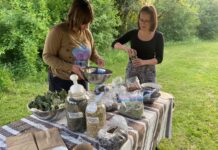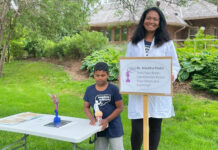For National Truth and Reconciliation Day, members of the University of Waterloo community gathered with Indigenous community members for a walk down Ring Road in solidarity with Indigenous peoples.
Senior members of both the Indigenous and UW communities gave opening remarks to a crowd of about 200, many wearing orange shirts. Those present included Elder Myeengun Henry, the faculty of health’s Indigenous Knowledge Keeper, UW President Vivek Goel, as well as Elder Jean Becker, UW’s associate vice-president of Indigenous relations, and Elder William (Bill) Woodworth, the elder in residence for both UW main campus’ faculty of engineering and UW’s school of architecture in Cambridge.
Henry began the event by acknowledging the troubling but necessary nature of reflecting on the past, stating, “Today we will be thinking about something that is uncomfortable not just in Indigenous societies but in society in general.”
Henry illustrated the plight many Indigenous people faced of being unable to find somewhere they belonged, having become isolated from their home communities and feeling unwanted in urban settings. “When you have time on your hands and pain in your heart, what do you turn to?” he asked the crowd, taking the opportunity to explain the long-term impact the residential schools have had on Indigenous communities, which sometimes came in the form of alcoholism to cope.
Henry ended his remarks on a hopeful note, stating, “Maybe we have to talk about the residential schools, and the poverty, and the suicide rates, but that’s not where the story has to end.”
Following Henry’s words, Goel gave a few remarks and emphasized the importance of learning from different perspectives to prevent the mistakes of the past from repeating themselves. He reminded the audience of the various roles, including the architects, engineers, teachers, nurses and police required in the building and running of residential schools, stating that these background characters were “doing what their society constructed as right.”
“All those professions I named, where did they learn? They learned in schools, and colleges, and universities, and they learned only from a certain perspective, and that’s why as we look forward, it’s so important that we include all perspectives, and in particular, [that] we include, and learn about, our Indigenous cultures, our Indigenous ways of knowing,” he stated.
Goel concluded his remarks by asking the audience to think about “moving forward, learning from the past and building a future without the same sorts of mistakes.”
Becker then expressed her happiness at the support the reconciliation movement has received. “I’ve been told that in some of our faculties, our students are coming and saying, ‘Where’s the Indigenous content?’ That makes me so happy, and I’m so grateful to all of you for coming and sharing this day with us.”
Woodworth, whose native name is Raweno:kwas, meaning “he dips the words”, began his remarks by thanking the three previous speakers, and echoing Goel’s point of the importance of listening to different perspectives.
Woodworth then spoke of a unanimous vote by the Six Nations to restore the Mohawk Institute Residential School to its original condition in 1909, to be opened as a museum of cultural genocide. “This is a step toward reconciliation…it’s about time we walked together,” he said.
After the remarks, the elders led the walk down Ring Road.
During the walk, Waterloo Mayor Dave Jaworsky praised the university’s commitment to reconciliation, stating, “What I wanted to do is come here to honour the changes under Jean and Vivek and others that are coming to the school because I think that’s so necessary and something we haven’t seen since the founding of the university, and to see such a dramatic change being made is wonderful.”
Jaworsky also described similar efforts made by the city to pursue anti-racism and inclusion initiatives, including the hiring of a diversity, equity and inclusion team with Indigenous initiatives advocate Brian Hill, from the Oneida of the Thames First Nation. “There’s lots of opportunities for staff to do different learnings…and I think if we stop hiding our history, embrace our history, and learn it correctly…we’ll know what to do going forward.”
Multiple students in the crowd expressed hope that the university would keep its promise. Arsema Teka, a third-year arts and business student, stated, “I respect [the university’s promises for reconciliation] and I really hope they follow through with it.”
Nadine Vanbreda, a first-year arts student, also expressed the importance of showing support for reconciliation. “It’s good to learn the next steps from people who know what the next steps should be… and so I really hope they’re not empty promises, cause that’s happened a whole lot.”
Both Vanbreda and Ruby Hong, a third-year environment and business student, reflected on the educational potential of the event, with Hong stating, “This is a very new culture for me, and it’s good to learn about it.”































